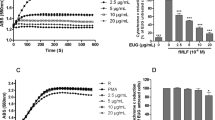Abstract.
In this study, the cellular localization of the inhibitory effect of a natural flavonoid cirsimaritin against formyl-methionyl-leucyl-phenylalanine (fMLP)-induced respiratory burst in rat neutrophils was investigated. Cirsimaritin concentration-dependently inhibited the superoxide anion \( \left( {{\rm O}_2^{ \bullet - } } \right) \) generation and O2 consumption (IC50 11.5±2.2 µM and 17.0±3.9 µM, respectively) of neutrophils. Cirsimaritin did not reduce, but slightly enhanced the \( {\rm O}_2^{ \bullet - } \) generation in phorbol 12-myristate 13-acetate (PMA)-activated or arachidonic acid-stimulated NADPH oxidase preparation as well as during the autoxidation of dihydroxyfumaric acid. Cirsimaritin did not elevate cellular cAMP levels, and only partially inhibited the fMLP-induced [Ca2+]i changes in the presence or absence of extracellular Ca2+. The phosphorylation of protein tyrosine, extracellular signal-regulated protein kinase and Akt caused by fMLP were attenuated by cirsimaritin in a concentration-dependent manner. In contrast, cirsimaritin had no effect on the phosphorylation of p38 mitogen-activated protein kinase. Cirsimaritin produced a concentration-dependent reduction in the formation of phosphatidic acid and phosphatidylethanol, in the presence of ethanol, from fMLP-stimulated neutrophils (IC50 15.1±6.5 µM and 15.6±3.4 µM, respectively), but did not affect the phosphatidylethanol formation in response to PMA. Under the similar concentration range, cirsimaritin attenuated the membrane translocation of ARF and Rho A. However, the GTPγS-stimulated membrane-associated ARF and Rho in cell lysate were unaffected by cirsimaritin. Collectively, these results indicate that the inhibition of fMLP-induced respiratory burst by cirsimaritin in rat neutrophils is likely mainly through the blockade of phospholipase D signaling pathway.
Similar content being viewed by others
Author information
Authors and Affiliations
Additional information
Electronic Publication
Rights and permissions
About this article
Cite this article
Wang, JP., Chang, LC., Hsu, MF. et al. Inhibition of formyl-methionyl-leucyl-phenylalanine-stimulated respiratory burst by cirsimaritin involves inhibition of phospholipase D signaling in rat neutrophils. Naunyn-Schmiedeberg's Arch Pharmacol 366, 307–314 (2002). https://doi.org/10.1007/s00210-002-0631-1
Received:
Accepted:
Issue Date:
DOI: https://doi.org/10.1007/s00210-002-0631-1




